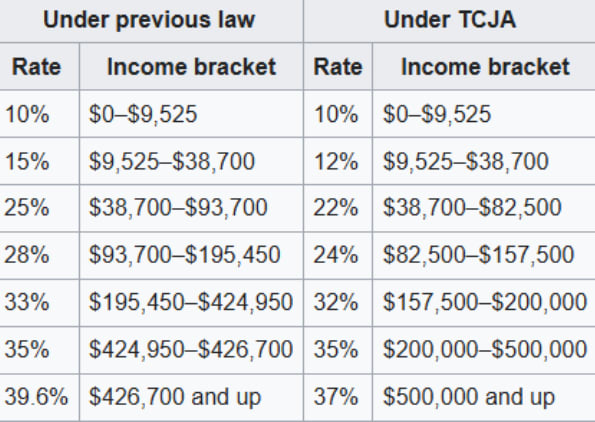“... but in this world nothing can be said to be certain, except death and taxes.”- Benjamin Franklin
Often joked about by children, yet never explained properly by adults, taxes are something we will all face. However, I’m not writing 10 pages on the US tax codes; the existence of such an arduous article would kill both me and you. Instead, I will be explaining why taxes are important, and a bit on how politics revolves around taxes. So after this, schedule a time with your parental figure and ask how it works in depth. Even if you understand taxes, still hire a tax accountant later in life though; a good one can find you savings and loopholes. But before that, I have to explain tax brackets. It will come in handy later.
Let’s take for example, a person who makes 83k a year. Does that mean someone making 83,000 dollars is being taxed 24% of their total income. No. It means that only $500, the amount above that 82,500 bracket, is being taxed at 24%($120). The rest gets taxed at their respective brackets(refer to the tiny, hard to read table). This results in a person who makes 83k being taxed $14,209.50, which is effectively 17% of their income. Obviously, this is an oversimplification, ignoring deductibles and other taxes. But it will do for now. Back to the article.
The government functions on taxes. Without taxes, it can’t do anything (remember the Articles of Confederation from APUSH?). The cruel part is, you are under two, or even three governments: Federal, State, and sometimes City (local). They each have their own taxes. But this is not just blatant robbery in an attempt to keep you poor. These taxes fund everything in your life. The fact that you are reading this, an article in a school newspaper, is thanks to taxes, and funding for this program was made possible by readers like you. The bus or subway you take is funded by city taxes, given as subsidies to the MTA. The meat you buy is cheaper due to subsidies(money given to help industries) from the federal government (although no amount of your taxes thrown at poultry farmers will ever bring eggs back for now). Also, a significant portion of federal taxes actually goes to social welfare programs like Social Security or Medicaid/Medicare. Or the fun money pit known as defense spending. This brings us to the next point: how the allocation of taxes and budgeting plays a huge role in politics.
Nobody likes being taxed, so obviously they support whoever says they want to decrease taxes or the federal deficit. In fact, Walter Mondale, the candidate for the 1984 presidential campaign admitted: ”Let's tell the truth. It must be done, it must be done. Mr. Reagan will raise taxes, and so will I. He won't tell you. I just did.” Despite being a show of honesty, many Americans simply saw this as him stating he will raise taxes, which caused him to be landslided by Reagan. So, an important lesson if you want to run for president, NEVER admit that taxes will go up, even when it’s blatantly obvious.
On the campaign trail, whether as president, representative, or senator, there are two common promises: offering to fix or implement something, or offering to reduce taxes or the cost of living. The local representative could campaign on the promise to relieve the migrant crisis and reduce crime. They can also campaign for removing congestion pricing, or lowering property tax. But in the end, everything has a cost. The cost of hiring more police officers could be less funding for parks or schools, greater city debt, or higher taxes. Likewise, lowering taxes could mean less funding for the police and other city services. On a national level, and this is no longer hypothetical: the cost of tax cuts for the rich is cuts on Medicaid. Let’s go into that briefly.
Starting at the beginning of 2018, the Tax Cuts and Jobs Act was enacted, lowering taxes for everyone. The new taxes look something like this:
That sounds good, as now the 15% went down to 12%, and 25% to 22%. Who could possibly go against this? Well first, this is not so much of a benefit to you as it is to the wealthy. While you, the poor or middle class citizen can enjoy a thousand dollars less in taxes, the millionaire enjoys tens of thousands less. Yet again, it doesn't sound like anything wrong to some people. You still benefit, right? In taxes, yes, but financially for the long term, no. Where do you think that missing tax money goes into? The military? Laughable; never going to happen. The reduced revenue is financed by cuts to social programs, like Social Security and Medicaid/Medicare. Or more importantly for you, Pell grants and SNAP. So, while initially sounding good, these tax cuts are actually a great detriment to the lower and middle class. But, with deceptively pretty words and rhetoric, any bad policy can sound good.
With that, I would like to close this article. May this wordy and taxing read open your eyes to the true lifeblood of American society and politics. Everything boils down to money. But do continue to learn about this matter. If not for knowing how to pay your taxes, at least for the political implications on your livelihood. Don’t be wooed by false promises of lower taxes. There is always something to pay.











